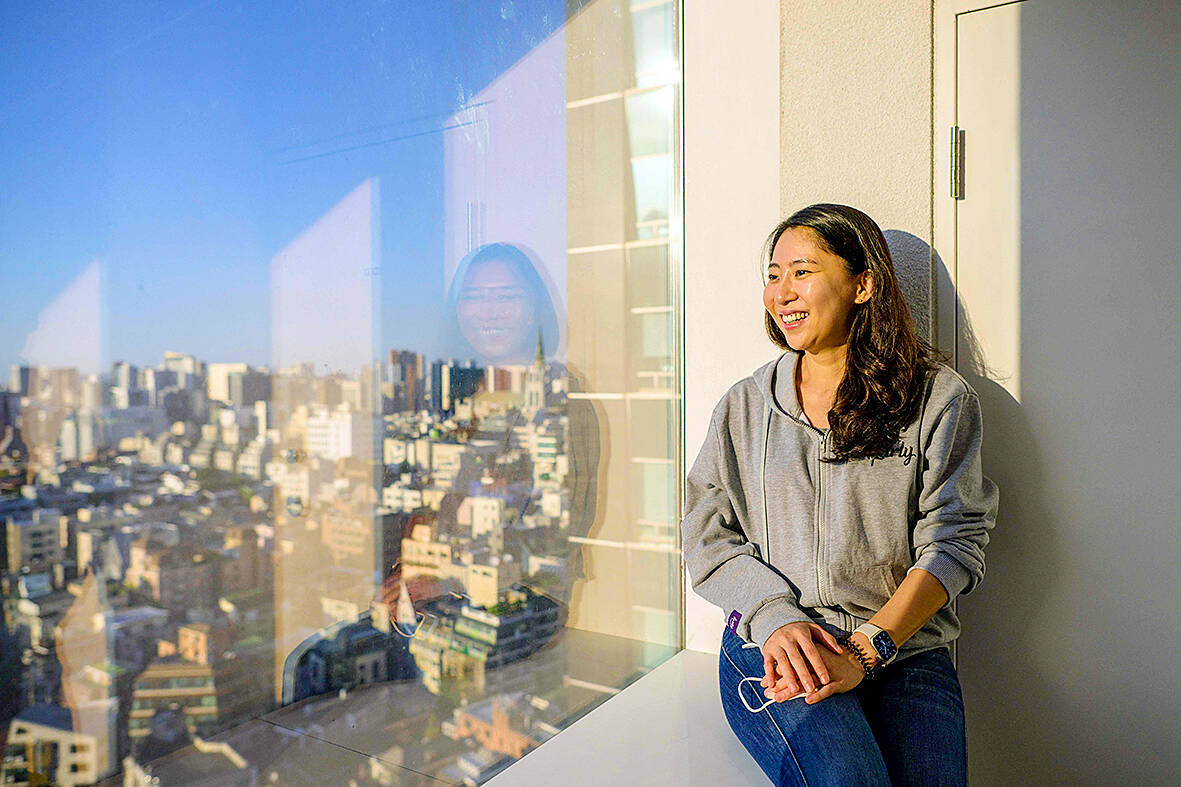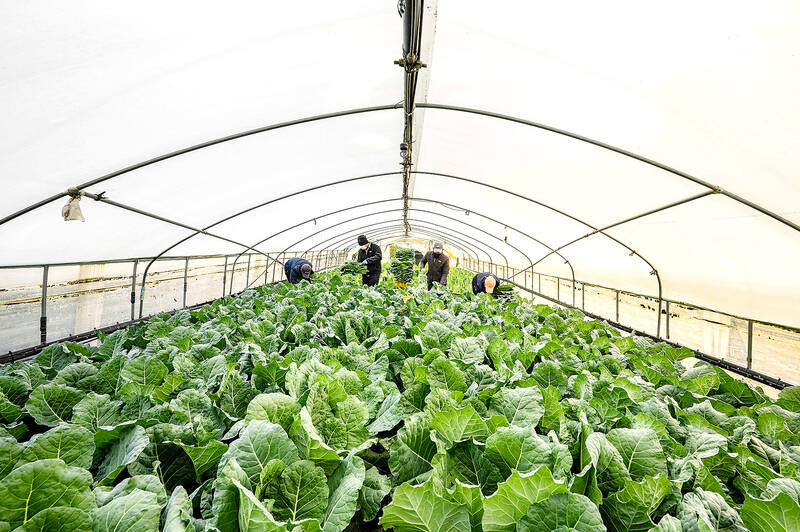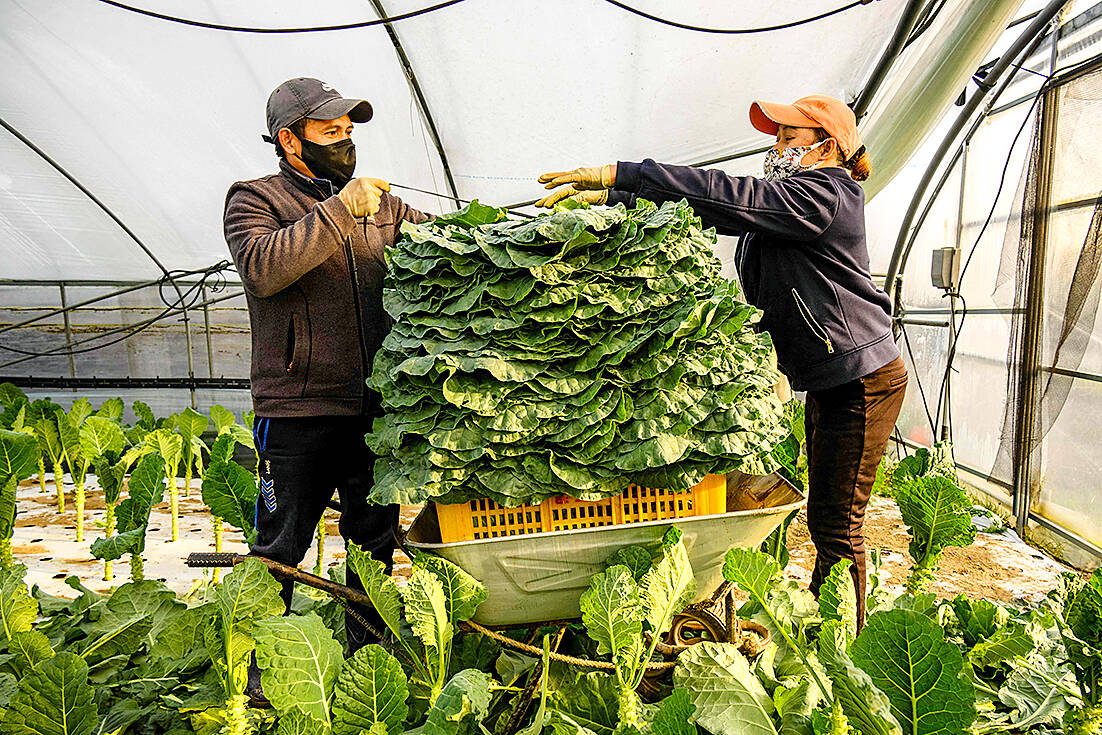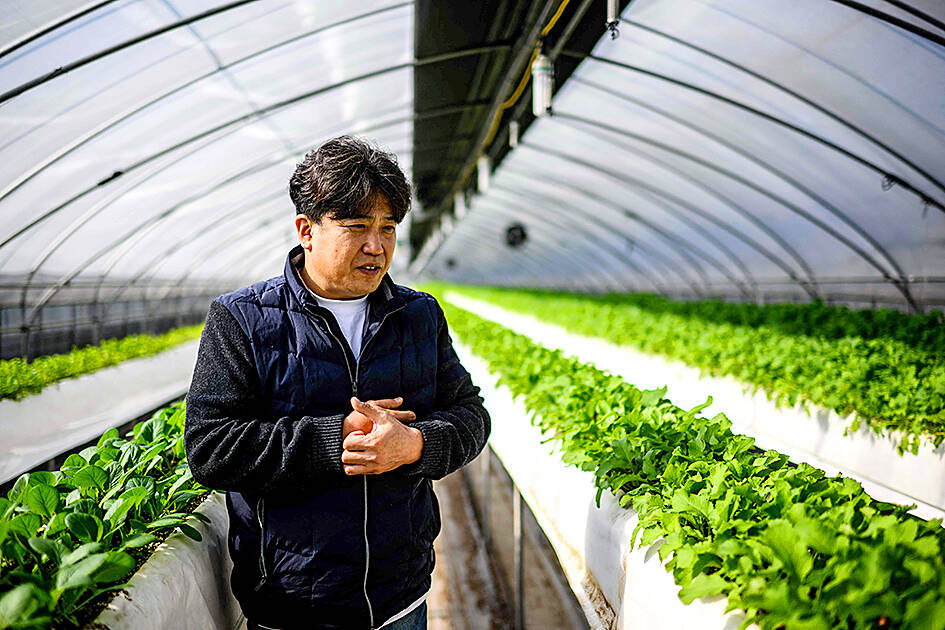When Sophie Kim moved home to South Korea after 15 years in the US, she couldn’t find anywhere to buy kale for her green juice. So she found a farmer, then built an app to help others seek out top-quality produce.
The next-day grocery delivery service Market Kurly that 38-year-old Kim founded is now one of South Korea’s most important startup unicorns, last valued at US$3 billion and set for an initial public offering by February.
Kim, a self-professed “foodie,” came up with the idea after she got tired of endlessly going from shop to shop to find the high-quality groceries she wanted in Seoul’s supermarkets.

Photo: AFP
But she knew the products were out there and began driving to South Korea’s agricultural heartlands to find them, for example visiting the famous meat market in Majang-dong to procure half a cow’s worth of beef, which she would then split with her co-workers.
“While I was trying to figure out why it was so difficult to have access to great quality, fresh food in Korea, I got to know some farmers and fishermen, and they had exactly the same issue of not being able to find customers,” she said.
Korean farmers “are proud of the fact that they can produce such nice quality products, but it is extremely difficult for them to get to the consumer,” she said.

Photo: AFP
At first, Kim said she thought about setting up a farmers market, before abandoning the idea as too unwieldy and — more importantly — unhelpful for producers, who don’t have the time to travel to Seoul.
LIGHTBULB MOMENT
It was a lightbulb moment when Kim realized “if we can make this work for both consumers and producers, it would probably be a breakthrough for the entire industry.”

Photo: AFP
Kurly customers — initially urban working women but now a diverse cross section of society — can order rare beef, hand-made bread or pick one of more than a dozen varieties of local, hard-to-find apples by 11pm and be guaranteed delivery by 7am the next morning.
As with companies from Amazon to Uber Eats, the rapid-fast shipments rely largely on gig economy drivers, and Kurly has not been immune to the global industry-wide complaints of overwork and poor conditions.
But consumer convenience has proved key to the app’s success — even though Kim says she’s most proud of how the complex data-driven logistics network she’s built supports South Korea’s beleaguered farmers.

Photo: AFP
Kim launched Market Kurly with 30 products, including her beloved kale, which was supplied by farmer Hwang Han-soo, who has been growing organic vegetables for 30 years at his farm in Gyeonggi province.
Hwang said that his kale was originally popular only with cancer patients for its perceived health benefits. He sold so little of it he considered switching crops, but the pleas of one of his terminally-ill customers in Busan convinced him to keep going.
Farming is tough in South Korea, Hwang said, owing to thin profit margins and a reliance on hard-to-find overseas workers amid dwindling interest in the industry from young South Koreans.
But working with Kurly has helped.
“In the early days of Kurly, we sold around 20 to 30 bags each day (but now) our average daily sales is around 800 bags” of kale, he said.
Part of the growth can be attributed to changing consumer trends, with kale now popular with young women who see it as a trendy health food, Hwang said, but Kurly’s next-day cold-chain logistics network also plays a key role.
SOCIAL COST
“It takes less than a day to go from harvesting to the consumer’s doorstep,” he said, adding that before Kurly came along it would take two or three days for his kale to make it to stores.
Next-day delivery services are “very helpful because it is a system that goes directly from the farm to the consumers,” while Kurly also handled all the promotion and marketing, he said.
“I can focus on farming,” he added.
Hwang also said reading reviews of his products on Kurly’s app allowed him to feel more connected to the people who eat what he grows.
South Korea’s next-day delivery apps including Kurly and rival Coupang Fresh have been criticized for the strain they put on delivery drivers, with local media reporting on occasional deaths from extreme overwork, as workers make scores of deliveries each night.
The rise of such services has also sucked gig workers from other crucial sectors including city taxis, where the supply crunch is so severe that the Seoul government recently hiked basic fares in a bid to entice more drivers to provide late-night services.
It is important for South Korea’s unicorns like Market Kurly to take into account the social costs of their business models, said Minister for Small and Medium Enterprises and Start-ups Lee Young.
“It’s very possible for these platform companies to contribute to society,” she said.
“Market Kurly is a very good example because it has created a very innovative idea and they have gone through multiple struggles until they achieved current success.”

On April 26, The Lancet published a letter from two doctors at Taichung-based China Medical University Hospital (CMUH) warning that “Taiwan’s Health Care System is on the Brink of Collapse.” The authors said that “Years of policy inaction and mismanagement of resources have led to the National Health Insurance system operating under unsustainable conditions.” The pushback was immediate. Errors in the paper were quickly identified and publicized, to discredit the authors (the hospital apologized). CNA reported that CMUH said the letter described Taiwan in 2021 as having 62 nurses per 10,000 people, when the correct number was 78 nurses per 10,000

As we live longer, our risk of cognitive impairment is increasing. How can we delay the onset of symptoms? Do we have to give up every indulgence or can small changes make a difference? We asked neurologists for tips on how to keep our brains healthy for life. TAKE CARE OF YOUR HEALTH “All of the sensible things that apply to bodily health apply to brain health,” says Suzanne O’Sullivan, a consultant in neurology at the National Hospital for Neurology and Neurosurgery in London, and the author of The Age of Diagnosis. “When you’re 20, you can get away with absolute

May 5 to May 11 What started out as friction between Taiwanese students at Taichung First High School and a Japanese head cook escalated dramatically over the first two weeks of May 1927. It began on April 30 when the cook’s wife knew that lotus starch used in that night’s dinner had rat feces in it, but failed to inform staff until the meal was already prepared. The students believed that her silence was intentional, and filed a complaint. The school’s Japanese administrators sided with the cook’s family, dismissing the students as troublemakers and clamping down on their freedoms — with

As Donald Trump’s executive order in March led to the shuttering of Voice of America (VOA) — the global broadcaster whose roots date back to the fight against Nazi propaganda — he quickly attracted support from figures not used to aligning themselves with any US administration. Trump had ordered the US Agency for Global Media, the federal agency that funds VOA and other groups promoting independent journalism overseas, to be “eliminated to the maximum extent consistent with applicable law.” The decision suddenly halted programming in 49 languages to more than 425 million people. In Moscow, Margarita Simonyan, the hardline editor-in-chief of the